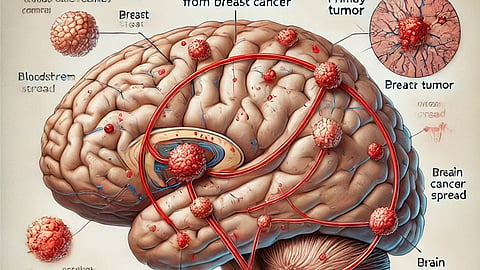As it turned out, this is indeed what happened when the SRS-ICB therapy was applied to primary breast tumors in a mouse model of breast cancer metastasis. When directed against breast cancer BrMs, however, the combination proved largely ineffective, even though the researchers could see that CD8+ T cells had flooded into the brain tumors and been engaged by anti-PD-1 antibodies.
“This suggested that something specific to the brain tumor microenvironment was inactivating the CD8+ T cells,” Wischnewski said. “Our analysis identified neutrophils and macrophages as those actors and showed that a subpopulation of these myeloid cells expressing particular genes were mainly responsible for the functional suppression of T cells in the brain metastases.”
Specifically, neutrophils expressing genes named S100a8 and a9 and macrophages expressing Trem2, a known suppressor of CD8+ T cell activity, were the main sources of T cell immune inhibition in ex vivo experiments. Myeloid cells with similar gene expression profiles have been linked in patients with other types of extracranial cancers to poor responses to ICB and shorter survival times.
“This research lays the foundation for devising immunotherapeutic strategies specifically designed to target brain metastases in breast cancer patients,” said Joyce. “But, more generally, it underscores the importance of tailoring such interventions to the distinct microenvironments of different types of brain tumors.”
References:
1) https://www.cell.com/cell-reports/fulltext/S2211-1247(25)00198-6?_returnURL=https%3A%2F%2Flinkinghub.elsevier.com%2Fretrieve%2Fpii%2FS2211124725001986%3Fshowall%3Dtrue
2) https://www.ludwigcancerresearch.org/scientist/johanna-joyce/
3) https://www.cell.com/cell/fulltext/S0092-8674(23)00977-7
4) https://www.nature.com/articles/s43018-023-00566-3
(Newswise/TL)


